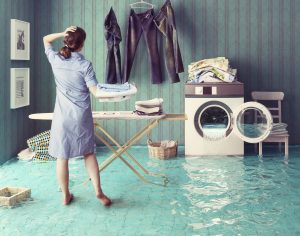Water damage is one of the biggest disasters that could happen to a homeowner, it could lead to flooding. Now, imagine coming back from work, or a vacation, or a timeout with friends and meeting a house flooded with water, that new Persian rug soaked and a lot of other things that could go wrong.
Whether it’s full-blown flooding or a leak, properly maintaining a home is one of the best ways to prevent water damage from water disasters.
Unfortunately, a lot of people fall victim to this because they don’t plan or foresee things like this. An old proverb says It’s better to be safe than sorry.
Between 2004 – 2008 water damage was the second-most frequently filed homeowner insurance claim. Unfortunately, there is a common misconception that water damage in your home is no big deal; however, this is far from the truth.
Statistics have shown that we are seven times more likely to experience water damage than fire damage and six times more likely to experience water damage than burglary because, in our daily dealings, interaction with water is a necessity.
Related – How to Prevent Common Household Fires?
What Are the Signs of Water Damage?
Water damage is obvious when it’s caused by a flood, but other causes are harder to spot. If you don’t know what to look for, it can be easy to miss until it becomes a major problem.
Here are the usual signs of water damage in a home:
- Peeling paint (this is the most obvious sign)
- Warping of your floors
- Strong musty smell in a room
- Sagging in parts of your walls or ceiling
- Discoloration on walls or ceilings
- Water pooling in your yard after a storm
- Mold growth (which can look like dark discoloration) on any surface
How to Protect your Home from Water Damage?
1. Know Your Water Main
A damaged hose or a burst pipe can send water racing into your home. Being able to locate and shut off the main water supply quickly will save stress, money and time.
Knowing the location of your water main and shutting it off when you leave for an extended amount of time can do your house a lot of good. If no water goes into the house, chances are no faucet drips can wreak havoc on your home.
2. Check Appliances Regularly
Check and maintain your appliances regularly for leaks according to the manufacturer’s directions. If you decide to ignore moisture damage or postpone making the necessary repairs, be prepared to experience mold, mildew, dry rot, or even structural damage to your home.
Your regular homeowner’s insurance does cover the water damage that comes from lack of maintenance, so be guided.
3. Inspect your Roof
Inspect your roof for missing, damaged and aging shingles and make necessary repairs because your roof is constantly exposed to sunlight and precipitation. If your roof begins to deteriorate, it can develop without you noticing.
But you can stay ahead of water damage by inspecting your roof regularly — especially after big storms. To do this, use a pair of binoculars to look for any missing or broken shingles, cracked flashing or large debris on the roof.
When you notice damages, you should never try to handle them yourself because you could make it worse. It’s safer to employ the services of a handyman.
4. Clean your Gutters and Downspouts
It’s also important to make sure to keep your gutters clean, to avoid blockage and ice dams, repair any gutter leaks, and check regularly to see that they drain properly.
In addition, inspect your downspouts, don’t forget to clean it to ensure water can flow through, and secure downspouts so that they point away from the home, mismanaged overflow may create puddles that could damage your foundation.
5. Upgrade Washing Machine Hoses
As little as this task is, it’s very necessary. Old or leaky and even brittle washing machine hoses are among the most frequent causes of water loss for homeowners. Replace yours regularly to avoid a disastrous situation.
6. Install Water Alarms
Consider the purchasing point of leak water alarms. Water alarms work like smoke alarms. When water is detected in a specific area, an alarm is triggered, warning you of a water threat. These sensors can be placed in basements, laundry rooms, bathrooms or even kitchens.
You might also want to keep belongings stored on shelves off the floor in basements. In case of water seepage or sewer backup, they’re less likely to get damaged.
The Takeaway
When it comes to preventing your house from water damage you’re not powerless now. There are plenty of simple tactics you can use to stay snug and dry no matter what nature or your pipes throw at you and a few have been outlined above for you.
If it’s too late, call our water damage restoration experts now and we will handle the problem for you.


 Why Do You Keep An Air Scrubber Running After A Mold Test?
Why Do You Keep An Air Scrubber Running After A Mold Test?
Leave a Reply